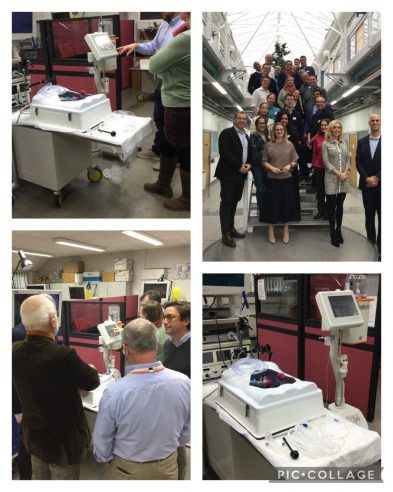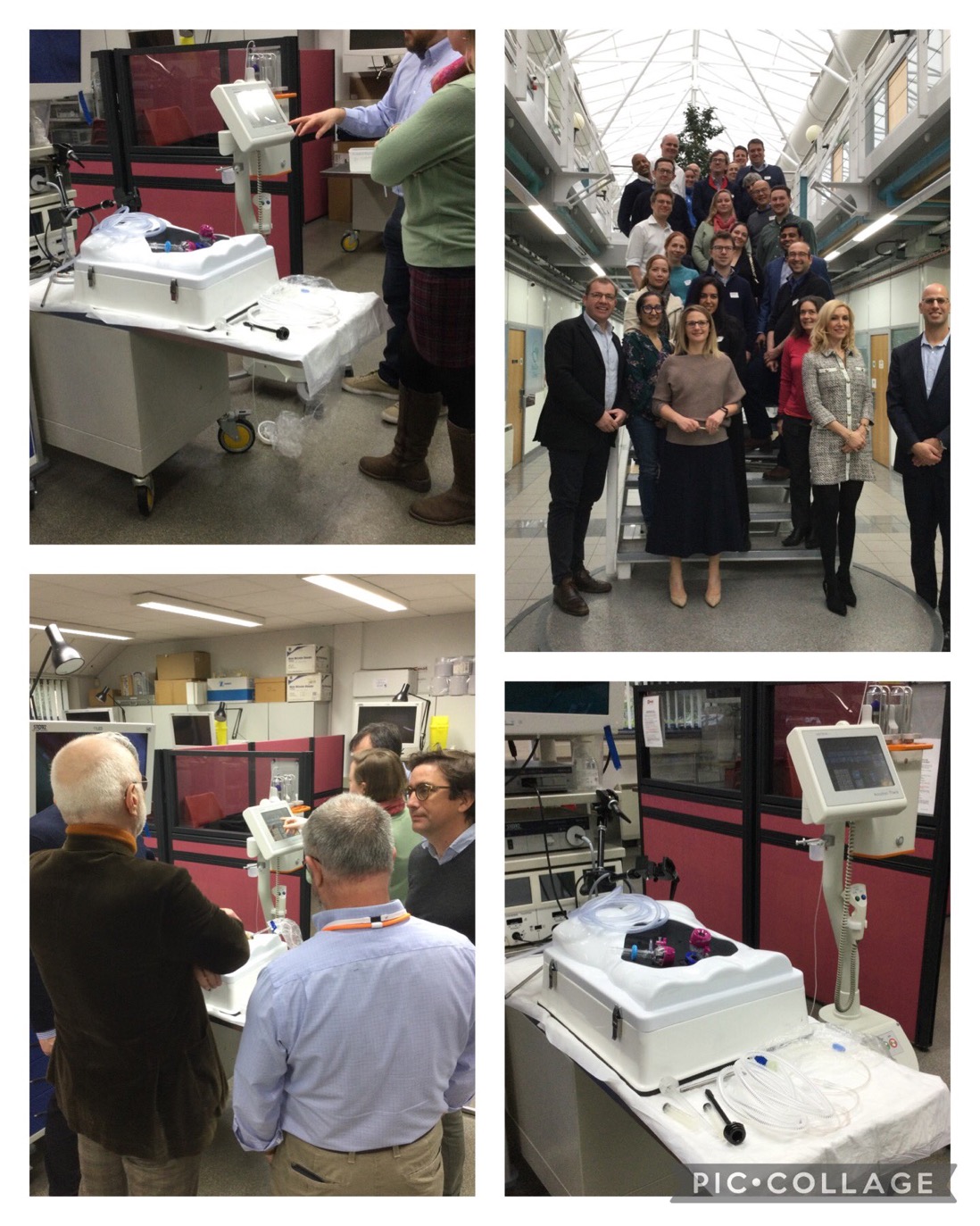The PICCOS Study: Evaluating Anti-Cancer Drug Delivery
24 April 2024
Study Name: Pressurised IntraPeritoneal Aerosolised Chemotherapy (PIPAC) in the management of cancer of the colon, ovary and stomach: a randomised controlled phase II trial of efficacy in peritoneal metastases (PICCOS for short).
Background
The study is funded by NIHR EME (Efficacy and Mechanism Evaluation) Programme Grant to treat patients with colorectal, ovarian or stomach cancer with peritoneal metastases. These are secondary tumours that can develop around the abdomen area. They cause a series of unpleasant symptoms with relatively rapid patient decline due to the new tumour growth. The study aims to address lack of treatment options for people with peritoneal metastases as they are difficult to treat with conventional anti-cancer drugs. PIPAC is a new anti-cancer drug delivery method to the peritoneal cavity as an aerosol during keyhole surgery. It’s been shown to deliver higher doses of chemotherapy drugs directly to the tumour sites in comparison to conventional therapy given via a drip (intravenously) with fewer side effects demonstrated due to less chemotherapy circulating in the blood stream.
The aim of this study is to develop high level evidence for the efficacy of this drug delivery method to these patient groups. This will be to determine whether it improves survival and quality of life (QoL) in patients with peritoneal metastases. This is the first randomised controlled trial (RCT) in the UK to assess the efficacy of this treatment and the impact on QoL for the patients and is based on recommendations from the National Institute for Health and Care Excellence (NICE). The treatment can currently only be offered to patients in the UK within this research clinical trial setting. Since these tumours are very difficult to treat, evidence about whether this treatment is more effective in the UK is paramount to decipher whether it should be brought into standard practice.
The study is aiming to recruit patients in three different disease groups using a basket trial design which essentially enables three trials to occur within one. The recruitment targets for each disease group are 78 patients for the colorectal group, 66 patients for the ovarian group and 72 patients for the stomach group. A delay in opening the trial has reduced the recruitment period to 20 months and it is anticipated that patient recruitment will be challenging. Equally, it is anticipated patients may drive the motivation to be involved in the trial, but their local site may not be signed up as a trial site. With site logistics as a general challenge, there is also a challenge for sites in England to open. This is due to a delay in the approval for claims of excess treatment costs process for the sites. There is also difficulty opening centres in Scotland and Northern Ireland, therefore, the trial is currently only open in Wales.

Study Design
In all cancer types, patients will be randomised to receive either standard of care (SOC) systematic anti-cancer therapy (SACT) delivered via the bloodstream/orally or a combination of SOC SACT and/or PIPAC, where three PIPAC procedures are performed. The trial is planning to open 30 recruiting/referral sites and 10 PIPAC administering sites with the appropriate training procedures in place for the PIPAC procedure. The trial design enables the variation required to include patients with different cancer types and, the ability to stop the trial for any one cancer type if it is not working whilst continuing with the others.
Communication is key within this hub and spoke model for site set up. Patients can be recruited into the trial at either the PIPAC or referral centres, but if randomised to the intervention arm and recruited by a referral centre, the communication links are important for the transfer of crucial information. We are working to encourage as many sites as possible to become involved in the trial not only to help reach recruitment targets, but to help the trial access as many patients as possible across the UK.
Involving the Public and Patients
The trial currently has a patient representative for each disease group (colorectal, ovarian and stomach) who sit on the Trial Management Group, attend TMG meetings that occur every three months and feedback on trial progress. There is then a wider Patient Advisory Group (PAG) with several members from charity-based connections. PAG meetings occurred before the trial started to allow feedback into study design, patient information sheets and feasibility aspects for patient involvement, with further meetings taking place. Recently a PAG meeting occurred to update the PAG on the current stage of the trial which has started recruiting and treating patients. However, since the trial is only open in Wales, this meeting allowed the members to feedback on potential routes to overcome this. By using the patient voice, patient perspective pressure can be placed and will hopefully have it’s own influence on processes. The trial will collect a lot of valuable information about this type of treatment, and we hope to provide meaningful information from it. The PAG will also be crucial during latter stages of the trial for dissemination of these results.
Partnerships
The trial team are working alongside the International Society for Study of Pleura and Peritoneum (ISSPP) with strong levels of support from the PIPAC community globally as the first RCT in the UK to test the intervention. Support for the trial has been clear in the development of the protocol for the PIPAC procedure and provision of training on the procedure which is given for free. This is an ISSPP accredited course that has provided training for many clinical staff involved. The Chief Investigators have also collaborated with industry partners who have provided the equipment required for the procedure at a discounted rate for sites to claim. Alongside several hospitals providing the treatment, there is also a board of experts that form different committees for the trial. This includes oncologists, surgeons, data analysists, statisticians and patient representatives to give an interdisciplinary perspective on the trial.
The trial team is collaborating with qualitative researchers at the University of Bristol and Swansea University to help establish the impact of this treatment on both patients and the healthcare workers facilitating the treatment. Collaborations have been developed with Radiology experts at Imperial College Healthcare NHS Trust, Cardiff & Vale UHB, Hampshire Hospitals and Royal United Hospitals Bath that have formed a Central Radiology Review Panel. This is because peritoneal tumours are known to be difficult to identify and monitor on scans. This Expert Panel will have oversight by reviewing these scans on a specialised platform called Cimar.
Research Impact
The trial is funded until the end of October 2026 and we will be recruiting until the end of October 2025. Since all patients will be followed up for at least 6 months after they are randomised into the trial, we need to allow time for this and the analysis of the results. With the current trial challenges, the trial team are looking at options on how to boost the recruitment numbers in the trial to achieve meaningful results and offer patients the maximum opportunity to be part of the trial.
The trial results produced will be the highest level of evidence collected based on UK patients and UK treatment systems. Results have the potential to change clinical practice in making PIPAC available to UK NHS patients subject to review by NICE. These results will also be crucial for the design of a confirmatory phase III trial. As well as analysing how patients’ tumours are progressing, the study will collect valuable information on QoL which will also be compared to standard treatment. This could be a large factor in determining the value of patient receiving this treatment as part of SOC.
- June 2024
- May 2024
- April 2024
- March 2024
- December 2023
- November 2023
- September 2023
- July 2023
- June 2023
- April 2023
- March 2023
- February 2023
- December 2022
- November 2022
- October 2022
- September 2022
- August 2022
- July 2022
- June 2022
- May 2022
- April 2022
- March 2022
- February 2022
- January 2022
- November 2021
- September 2021
- July 2021
- June 2021
- May 2021
- March 2021
- February 2021
- December 2020
- November 2020
- September 2020
- August 2020
- July 2020
- January 2020
- December 2019
- October 2019
- September 2019
- July 2019
- June 2019
- May 2019
- April 2019
- February 2019
- December 2018
- November 2018
- October 2018
- September 2018
- August 2018
- July 2018
- June 2018
- May 2018
- April 2018
- March 2018
- December 2017
- October 2017
- August 2017
- July 2017
- June 2017
- May 2017
- April 2017
- March 2017
- February 2017
- January 2017
- December 2016
- October 2016
- August 2016
- June 2016
- April 2016
- March 2016
- February 2016